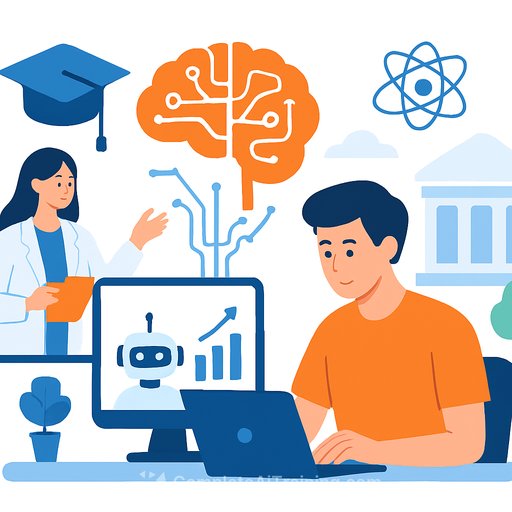U.S. Education Secretary Linda McMahon visits Alpha School Austin to see AI-driven "2-hour learning" in action
U.S. Education Secretary Linda McMahon met with students at Alpha School in Southwest Austin to observe its "2-hour learning" model powered by AI-developed curriculum. Sitting with a 10-year-old student, Everest Nevraumont, McMahon watched as the learner moved through personalized lessons at her own pace.
"In reading, I'm grade nine, but in math I'm only grade five," Nevraumont said. "In reading, I've advanced way faster." McMahon called the approach "the most exciting thing [she's] seen in the education world in a long time."
What Alpha's model looks like
Alpha School runs core instruction through AI-driven curriculum for two hours each day. Adult staff members known as guides support students instead of traditional teachers during this block.
The rest of the day is dedicated to practical skills-finance, entrepreneurship, and public speaking-through workshops and group projects. "Using artificial intelligence is what enables us to raise human intelligence, not just for the students but also for the teachers," said co-founder MacKenzie Price.
Why this matters for districts and schools
Personalized pacing can surface real learning levels across subjects and reduce idle time. The guide model frees credentialed staff to focus on feedback, coaching, and higher-order tasks.
Texas Education Commissioner Mike Morath underscored the need for careful deployment. "If you don't use it in the right way, it can either become distracting or ultimately become harmful," he said. "It just depends on how it is deployed."
Practical takeaways for implementation
- Start with a pilot: one grade band, one subject, 12-16 weeks. Define entry criteria, supports, and clear exit measures.
- Protect instructional time: set a daily block for AI-supported learning with tight routines and clear roles for guides.
- Train your adults: coach guides on facilitation, data use, and escalation-short cycles, weekly calibration, and walkthroughs.
- Measure what matters: track growth, proficiency, engagement, and time-on-task; compare to non-AI classrooms.
- Equity first: ensure device access, bandwidth, accessibility features, and supports for multilingual learners and students with disabilities.
- Data governance: require vendor transparency on data privacy, model behavior, bias mitigation, and content sources.
Key questions to ask vendors
- What evidence shows impact on growth and proficiency for similar student populations?
- How are errors, bias, and age-appropriateness handled? Who reviews content and how often?
- What teacher/guide dashboards are available? Can we export data to our SIS/LMS securely?
- How does the system adapt pacing and prerequisite review without trapping students in endless remediation?
- What implementation support, PD, and on-site coaching are included in year one?
Policy and funding context
McMahon's stop in Austin is part of her "Returning Education to the States" tour, which has included roughly a dozen schools. The tour follows a March executive order from President Donald Trump to dismantle the Education Department, and arrives alongside a budget proposal that would reduce education spending by about 15% in FY 2026.
The proposal includes reductions to Title I while increasing funding for special education and charter schools. McMahon said the goal of the tour is to learn what practices work in each state and share those lessons.
Texas context
Texas has expanded technology options in schools, including 2021 legislation that broadened virtual learning. In 2023, the State of Texas Assessments of Academic Readiness moved fully online, signaling a system-wide push to digital delivery.
For reference on the online transition, see TEA's STAAR redesign. For broader guidance on AI use in classrooms, the Office of Educational Technology provides resources here: Artificial Intelligence and the Future of Teaching and Learning.
What's next for leaders
If you're considering AI-supported instruction, identify a clear problem statement first-unfinished learning in a specific subject or grade span-and align your pilot to that aim. Set up a governance group with curriculum, special education, multilingual, IT, legal, and campus leaders.
Run a time-bound pilot, publish your rubrics for success, and commit in advance to scale, iterate, or stop based on evidence. Communicate with families early and often about goals, safeguards, and how progress will be reported.
Related professional learning
For teams exploring practical training and tooling, review curated options by role: AI courses by job.
Additional notes from the visit
Alpha School was founded in 2014 and operates in Arizona, California, Florida, and New York, with a Houston campus slated to open this winter. McMahon is the second education secretary to visit an Austin campus in two years; in 2023, Miguel Cardona toured Webb Middle School to promote bilingual education.
Your membership also unlocks:






